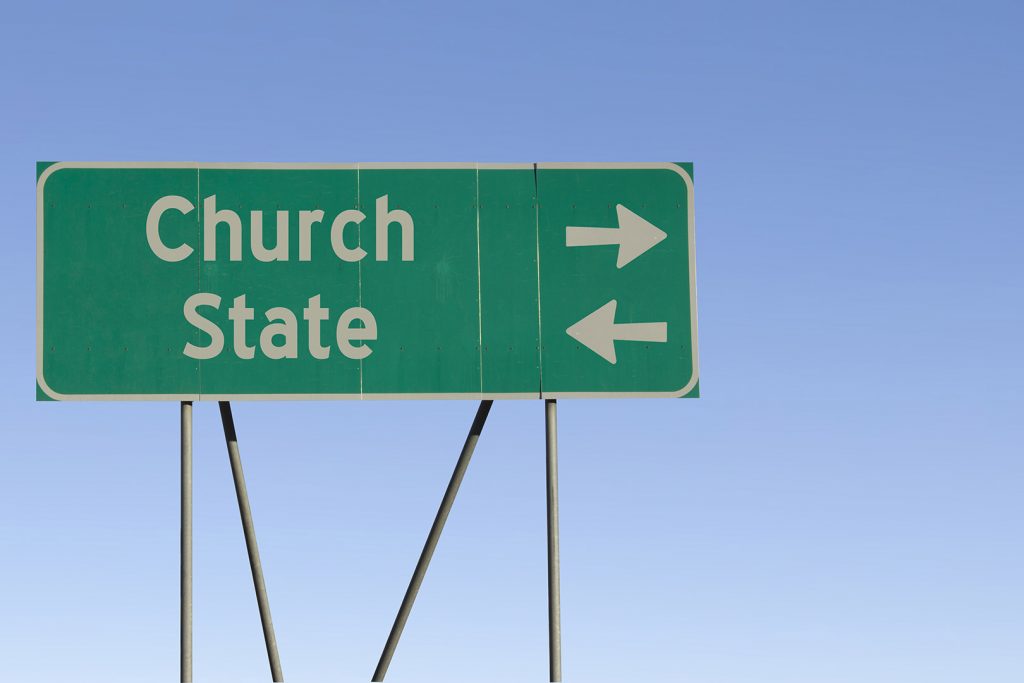
A coordinated push by religious groups is resulting in an explosion of legislation across the country that mandates the inclusion of “In God We Trust” in schools and other constitutionally dubious public religious expressions. With a conservative majority on the Supreme Court, activists are hoping any litigation will result in important judicial victories that serve as long-term precedents for the expansion of religion into the public sphere.
While advanced by conservative groups, this agenda has received crucial support from some Democratic legislators, including in Florida, where an In God We Trust law was passed in response to the massacre at Marjory Stoneman Douglas High School in Parkland, Florida.
For many legislators, the laws represent an easy and costless way to signal their religious bona fides to conservative voters. Students who are non-believers or members of other faiths, however, are much less enthusiastic.
“Project Blitz”
According to the activist group Americans United for Separation of Church and State, the legislative push is called “Project Blitz.” Modeled after the right-wing American Legislative Exchange Council, which provides legislatures across the country with model bills that advance an extreme small government, pro-business agenda, Project Blitz is aimed at passing a range of religious legislation.
According to AU, there were 25 In God We Trust bills proposed in 2018. Six states successfully passed such a law – Alabama, Arizona, Florida, Louisiana, Tennessee and North Carolina. In Arizona, the law allows schools to post the state motto – “God Enriches.”
The law in Florida was first proposed by Representative Kimberly Daniels, a Jacksonville Democrat. She introduced her bill after the massacre in Parkland, when students descended on the state capitol in Tallahassee to demand action. As quoted in The Washington Post, Daniels said, “It is not a secret that we have some gun issues that need to be addressed. But the real thing that needs to be addressed are issues of the heart.”
Daniels’ bill, which was eventually passed and signed into law, required that every student in Florida be educated in a building where “In God We Trust” was prominently placed.
In Alabama, voters approved a ballot initiative that allows the posting of the Ten Commandments on public grounds. The initiative is a response to a controversy that dates back nearly 15 years, when Roy Moore, then the chief justice of the Alabama Supreme Court, had a massive Ten Commandments monument erected at the Alabama Judicial Building. A federal court ordered him to remove the monument, and Moore was removed from his post after he refused to comply.
Similar laws were introduced in states as diverse as Minnesota, Pennsylvania, Illinois, Missouri and Wyoming, though they failed in those legislatures.
A New Legal Landscape
Some of these laws – especially the Alabama measure – are likely to inspire legal challenges. But to the backers of these measures, that fact is a feature, not a bug.
As with abortion, the legal landscape for public religious expressions was changed dramatically by the elevation of Brett Kavanaugh to the Supreme Court. Justice Kavanaugh has a lengthy track record of supporting religious interests in similar cases, and most observers expect him to vote similarly in cases before the Supreme Court.
While Supreme Court Justices can sometimes vote in unexpected ways, there are now five Justices with clear track records of looking favorably on state-mandated public religious expressions. Activists are betting that a legal challenge to an In God We Trust law that makes it to the Supreme Court will end with a 5-4 decision in favor of the law.
And that would mean more than one law – or even one type of law – being upheld. Such a decision would establish a favorable precedent for religious sentiments in public facilities, emboldening conservative activists across the country to agitate for laws that push the legal envelope even further.
A Chicago Satanist sued earlier in the year in an effort to strip the phrase “In God We Trust” from US currency. But his case was struck down in June by a higher power – a federal judge, who ruled that the motto did not qualify as a religious endorsement.



Leave a Comment